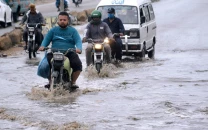Crumbling water infrastructure
.

Once again, Karachi stands on the brink of a water crisis. For the next five days, residents across nearly every district will face a crippling 40% shortfall in water supply, as critical repairs are carried out on two 84-inch pipelines. KWSC has urged citizens to store water in advance and use it sparingly — a grim routine that is becoming all too familiar for Karachiites.
This is not the first such episode, nor will it be the last if structural issues are not addressed. In February, similar maintenance work on other major lines left vast stretches of the city dry. In December, a cascading series of leakages in an 84-inch main line — exacerbated by construction near University Road — plunged many neighbourhoods into a two-week-long water emergency.
The recurring nature of these breakdowns is no coincidence. Karachi's water infrastructure is dangerously outdated and overburdened. The city currently receives just 650 million gallons per day (MGD) against a requirement of 1,200 MGD, and the upcoming repair work will slash even that by 200 MGD. Decades of neglect and ad-hoc patchwork repairs have left the city's water distribution network in a state of collapse. Temporary fixes may stop the bleeding, but they won't heal the wound.
What Karachi needs is not another set of repair operations stretched beyond deadlines, but a comprehensive plan to rebuild the water infrastructure from the ground up. This includes replacing aging pipelines, modernising pumping stations, introducing water metering and leak detection systems, and ensuring transparency in operations. Until we shift from mismanagement to meaningful investment and structural reform, the taps in Karachi will continue to run dry and people will continue to pay the price.















COMMENTS
Comments are moderated and generally will be posted if they are on-topic and not abusive.
For more information, please see our Comments FAQ